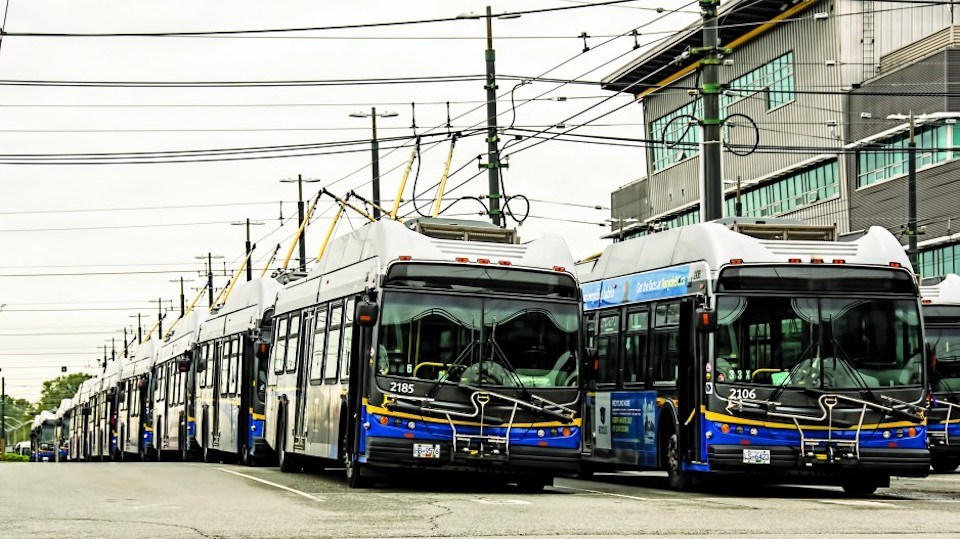Two years after the start of the pandemic, TransLink ridership is still chasing pre-COVID-19 levels like a commuter hustling to catch the bus as it peels away from the curb.
February boardings stand at 64.5 per cent of pre-pandemic levels – up from 57 per cent in January – and the regional transit authority’s goal is to get ridership up to 80 per cent by the fall.
That’s also when mayoral and city council hopefuls will be pitching promises during the next municipal elections (Surrey Mayor Doug McCallum secured the mayoralty last time after pledging to scrap the city’s already-approved light-rail system in favour of a SkyTrain extension).
Ahead of the elections, experts say there must be solid regional collaboration geared towards long-term thinking if major transportation priorities are to be realized.
“We’re now in a place where COVID has really added this extra conundrum,” said Andrew Pau, Deloitte Canada’s transportation leader for –°¿∂ ”∆µ
Rather than follow a “build it and riders will come” approach, transit authorities must now get into the minds of riders to better understand where they’re going and why they’re going in order to rebuild ridership and restore revenue, according to Pau.
“Here’s the simple truth. We have population growth in our region.… And that means there’s more demand on transportation, and so we have to think about where we want to be in not just the next two years or four years,” said Werner Antweiler, an associate professor with expertise in urban mobility at the University of British Columbia’s Sauder School of Business.
“We need to think about longer time horizons rather than just the next election.”
TransLink and the regional Mayors’ Council on Regional Transporation unveiled a series of 10-year priorities under its Transport 2050 plan late last month. It includes doubling regional bus service levels, adding as many as nine bus rapid transit routes on dedicated lanes, building a rapid connection to the North Shore and creating 450 kilometres of new cycling paths.
Antweiler said cities’ biggest needs fall under three major categories:
Bus rapid transit
“This is actually a very cost-effective tool,” Antweiler said, “because for every kilometre we cover with bus rapid transit, which is a dedicated lane, we can deliver service in regions that are not as dense that will justify the expense of a rail rapid transit system.”
Pau, who lives in Delta’s Ladner community and commutes to downtown Vancouver, said deploying bus rapid transit is also considerably more flexible than rail services.
While motorists might blanche at the idea of giving up a lane of traffic to these bus routes, Pau said the point is that it’s meant to shift commuter behaviour from dependency on single-occupancy vehicles.
Parking
Vancouver City council floated the idea of pursuing citywide residential parking permits last fall as part of the city’s Climate Emergency Action Plan before ultimately nixing it during a contentious vote.
“If you look at how much space is dedicated to parking, as opposed to moving vehicles and transit, that is where the problem is,” Antweiler said, adding that dedicating prime real estate to parking spots along major thoroughfares isn’t an effective use of space.
Pau said the issue is especially complex considering the right balance that needs to be struck between businesses that rely on vehicle traffic and the deterrent effect an abundance of cheap parking poses for would-be transit users.
Mobility pricing
Road tolls have proven to be decidedly polarizing for Metro Vancouver motorists.
TransLink and the Mayors’ Council examined the issue from 2017-18 through its Mobility Pricing Independent Commission and received strong pushback from business groups against the idea of charging drivers to cruise across different parts of the region.
For now, Vancouver City council is still working with TransLink on exploring congestion pricing further, with council set to vote on advancing the recommended options sometime in 2023 – after the municipal elections.
“We need to reduce the taboo around it,” Pau said.
As more people adopt electric vehicles, and tax revenue from gasoline shrinks, the region must look at alternative ways of raising cash, he added.
“There’s no harm in admitting that cities need to make some money,” Pau said. “If you like the fact that water flows the moment you turn the tap on or the light magically turns on once you hit the switch – government needs to be sustainably funded in order to make those things happen.”
Antweiler said as the population continues to grow, the region will need to manage existing road capacity wisely rather than build additional streets and roads.
“There’s just no space to do that.”
Antweiler added that many drivers reflexively declare they must drive to work and won’t consider transit options.
“This is one of the challenges we face, that some of the solutions that economists understand to be efficient are not very popular.”



